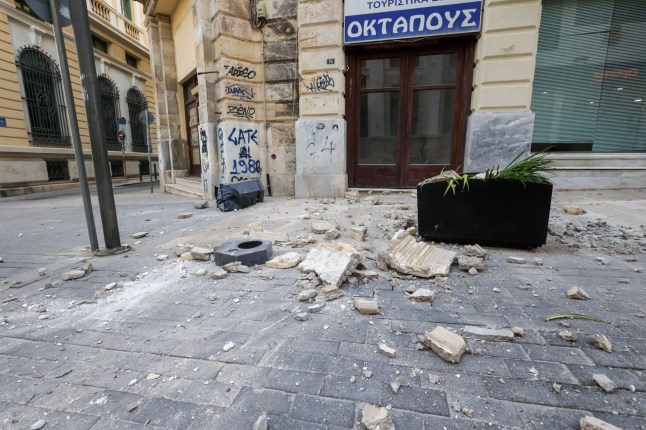
Debris next to a building following an earthquake off the coast of Crete (Picture: REUTERS)
Holidays are supposed to be an opportunity for rest and relaxation,but there is always a risk of experiencing natural disasters while abroad.
Risk levels vary depending on where you travel,as some countries face a higher risk of earthquakes,tsunamis,tornados and flooding than others.
Greece is one of the most seismically active regions in Europe,due to its location on the fault line between the Eurasian and African tectonic plates.
This means that there is an increased risk of experiencing an earthquake when visiting Greece and its islands compared to other holiday destinations.
Right now,the country is under a tsunami warning after a 6.1 magnitude quake hit off the coast of Crete early this morning.
The Greek government has issued a national directive,ordering locals and tourists to ‘move away from the coast and reach a higher place’.
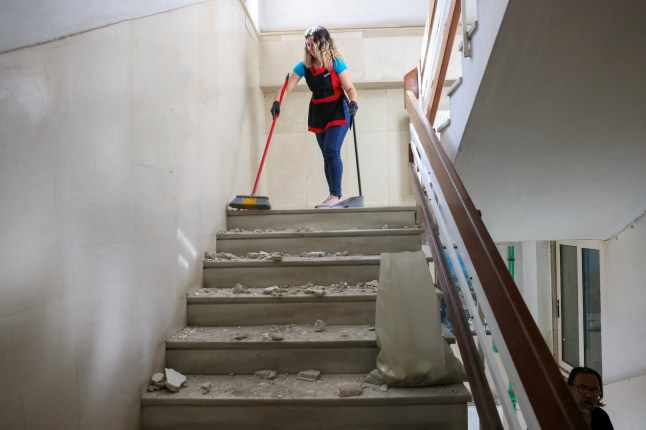
The earthquake has caused some minor damage (Picture: REUTERS)
Last week a 5.9 magnitude earthquake was recorded off the coast,sparking another temporary tsunami warning and fears that the islands of Crete and Rhodes may not be safe to visit.
But what should you do if you experience an earthquake while you’re abroad? Metro has the answers.
The UK Foreign Office has issued advice for Brits planning to travel to the Greek islands.
They say: ‘The area around the Cycladic islands of Santorina (Thira),Anafi,Ios and Amorgos,experienced increased earthquake activity in early 2025.
‘This increased has since subsided and the tourist season is expected to continue as usual.
‘There is a risk of earthquakes and earth tremors in Greece.
‘You should familiarise yourself with safety procedures in the event of an earthquake,follow advice given by the local authorities,and call the Greek emergency services on 112 if you are in immediate danger.’
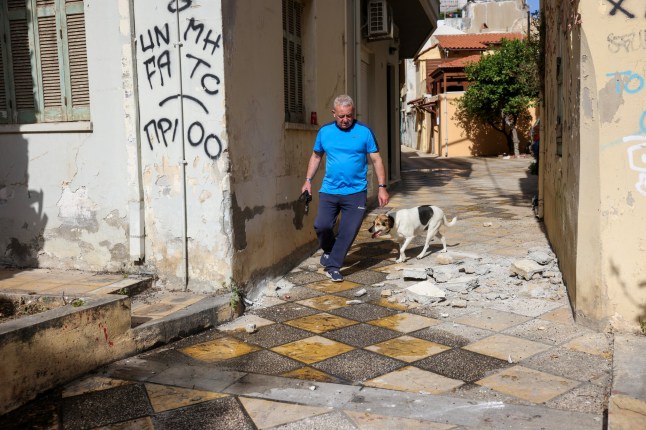
A man and his dog walk past debris (Picture: REUTERS)
In general,if you become aware of an earthquake while you’re abroad,the Foreign Office suggests following the following steps:
Sign up to receive email alerts when FCDO travel advice is updated
Keep in touch with your travel or tour operator and your hotel (where applicable)
Monitor local radio,TV and press
Follow the advice of local authorities,including any evacuation orders
Be familiar with advice that is specific for hazards (such as ‘drop,cover,hold’ in an earthquake)
Check in with family and friends in the UK
Be prepared in case you need to move to a safe place at short notice – keep any essential items and supplies such as travel documents and essential medication together
Most countries offer an emergency alert service,to notify people if there is a risk of a major incident or natural phenomena like an earthquake.
The Greek government has an Emergency Communication Service,which can send out alerts written in English.
In order to sign up for these alerts,the Foreign Office has shared the following instructions:
For iPhones go to Settings > Notifications and enable the ‘Emergency Alerts’ option at the bottom
For Android 11 and higher go to Settings > Notifications > Advanced Settings > Wireless Emergency Alerts
For Samsung devices go to Settings > Apps > Messages > Notifications > Emergency Notifications and enable the ‘Emergency Alerts’ option
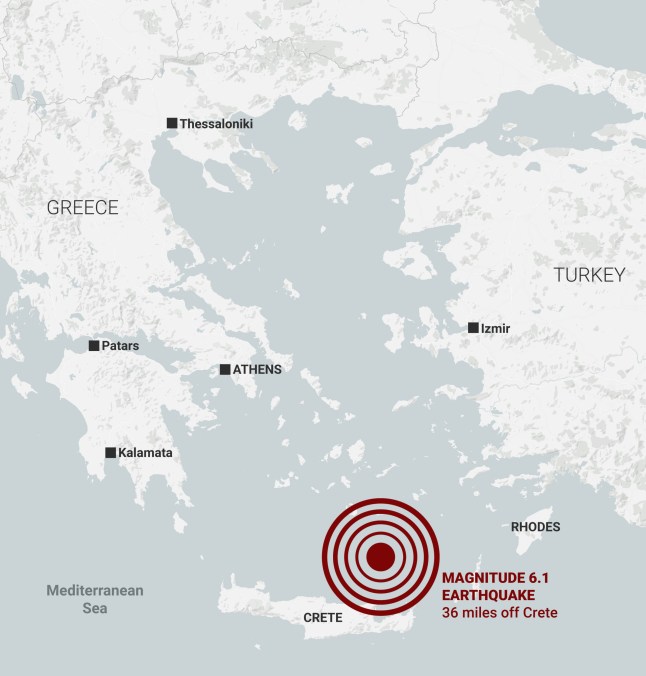
The earthquake hit off the north coast of Crete (Picture: Metro Graphics)
Experts at Avanti travel insurance told Metro said there are steps you can take if your trip could be affected by a natural disaster,including to try and change your plans or get a refund.
They said: ‘The first thing you should do is contact your holiday provider to see what support they can give you as they may be able to provide an alternative,refund or reschedule your trip.
‘If your holiday provider can’t help you reschedule or refund your costs,you should contact your bank. You may be able to recoup your costs through a “chargeback claim” if you paid using a credit card.
‘If you’ve tried both options without any luck,then you may be able to claim through your holiday insurance. It’s important to check your policy documents before cancelling a trip or if you decide not to travel so check out the “Travel Delay” section in your policy wording to find out if a natural disaster is covered.
‘If you’re already on holiday and your return journey to the UK is delayed or cancelled speak with your holiday provider for alternative options.
‘In this instanced your travel insurance policy should automatically extend to cover the extra time you need to get home. However,always check with your insurance provider to on the safe side.
‘You will also need to speak with your holiday provider if you’re accommodation is affected as they may be able to find you an alternative place to stay or if necessary,bring you home early.
‘Lastly,if your travel arrangements change be sure to update your travel insurance policy and be aware that traveling against FCDO advice may invalidate your cover so keep up to date with the latest announcements on the FCDO website.’
Meanwhile Alice Lawson,associate director of insurance at Holiday Extras,told Metro that coverage for natural disasters isn’t usually covered by travel insurance as standard,but some providers will offer cover for natural disasters as an optional extra.
She explained: ‘If you’re travelling to a destination where natural disasters could be a possibility,it’s important to make sure that you have read the policy details of the insurance product you’re considering before purchasing it.
‘If there is a natural disaster at your destination but holidays are still considered safe to continue,there’s no insurance cover available; if your holiday is still going ahead but you decide not to travel just in case a natural disaster happens,insurance providers usually wouldn’t reimburse you for deciding not to fly.
‘In the unlikely event that your provider can’t fulfil their duty you may be able to claim against your insurance – in most overseas emergencies in the past either the airline,holiday provider,or in extreme cases the UK government have stepped in to get people home.’

Products have been knocked off the shelves (Picture: Cretapost.gr)
The Greek Ministry for Climate Crisis and Civil Protection has shared advice on what to do if you experience an earthquake while in Greece.
If you have been alerted that an earthquake is likely,they suggest you prepare by fastening shelves and heavy furniture to the walls and moving tall furniture which could fall and block exit doors.
Heavy items should be placed on lower shelves and removed from above beds and sofas.
You should find safe spots in each room of the house,located away from exterior walls and glass surfaces and ideally underneath sturdy tables or desks.
You should know how to turn off electricity,water,and gas supply,and also know Greece’s emergency phone number,which is 112.
Ideally you should also have a portable radio with batteries,a torch,and a first aid kit.
Another potential concern when it comes to earthquakes is the lack of access to the internet,with the possibility of tremors knocking out electricity and IT systems.
This could make it impossible to pay for anything with a debit or credit card,Simon Phillips from No1 Currency warns.
He told Metro: ‘Most of us take card and contactless payments for granted,and the technology is great – right up until the moment it stops working.
‘In April nationwide power outages in Spain and Portugal turned millions of people’s smartphones into expensive paperweights and left them with only one way to pay for things – cash.
‘Keeping some cash in your purse or wallet when you’re overseas is common sense. It’s easy to use,there are no hidden charges and you can always rely on it if digital payments go down.
‘Card and contactless payments are useful,practical and safe. But they rely on tech infrastructure that is fallible,and this is why you should always keep some cash as a back-up,both in Britain and especially when you’re travelling abroad.’
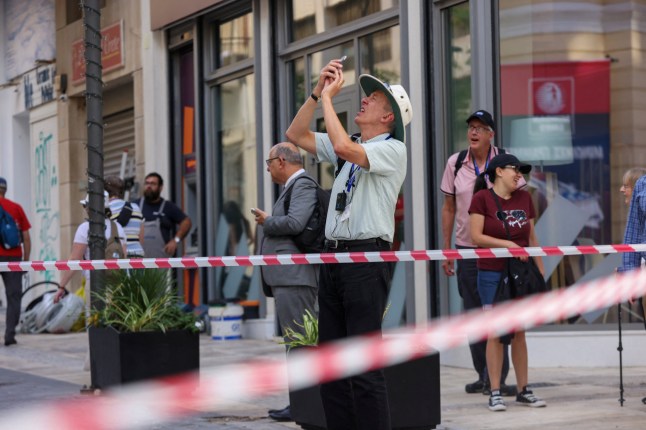
A tourist taking pictures of a damaged building (Picture: REUTERS)
During an earthquake,the first piece of advice is to stay calm.
You should take cover under sturdy furniture and hold its leg,but if there isn’t any suitable furniture,lower your height as much as possible and protect your head and nape with your hands.
Move away from large glass surfaces,furniture or objects that could injure you. Don’t try to leave the house or go onto a balcony.
If you’re in a tall building,stay away from glass and interior walls.
If you’re in a public building like a shopping centre,stay indoors until the earthquake stops and stay away from any panicked crowds due to the risk of trampling.
If you’re outdoors,move away from buildings and electric or phone cables and cover your head with a bag if available.
If you’re in a car,park the car in an open space away from tunnels or bridges and try not to obstruct traffic.
Once the earthquake has ended,be aware that there could be further aftershocks.
Check if anyone around you is injured and do not move anyone who is seriously injured.
Evacuate the building you’re in via the stairs,without using the lift,after switching off the electricity,gas and water,and go to an open outdoor space.
Don’t drive unless there’s an emergency,to keep the roads clear for the emergency services,and only use your phone in an emergency to avoid network overload.
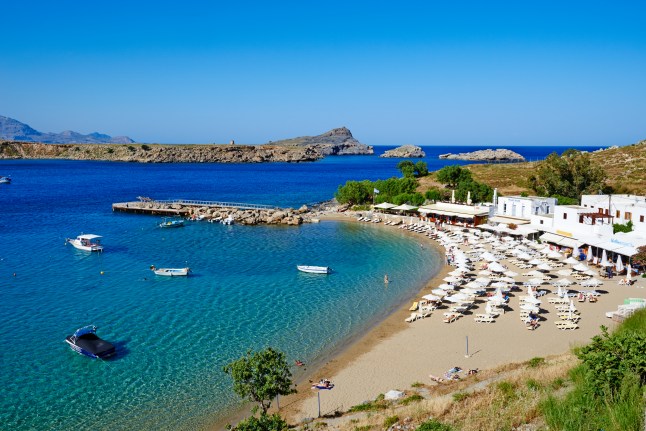
Coastal areas can be at risk of tsunami after an earthquake (Picture: Getty Images)
Not all earthquakes can cause a tsunami,but if you’re in a coastal area it’s worth checking if there is a significant rise or fall of the water level,which acts as a warning for an oncoming tsunami.
You should leave the seashore and head to areas of higher altitude,and stay away from seaside areas until authorities say the danger is over.
The Civil Protection Ministry warns: ‘Do not approach the shore in order to watch a tsunami coming. When you see the tsunami coming,it will probably be too late to avoid it.’
Greece has seen an increased amount of seismic activity in the last 24 hours.
Its Institute of Geodynamics has recorded around 409 seismic incidents in the last seven days,with more than 120 of those taking place in the last 24 hours.
While a cluster of them happened in around the same location as the 6.1 magnitude quake,many have also occurred in the sea around the islands of Fira and Amorgos,as well as around the Greek mainland.
There have been 37 quakes recorded since the 6.1 magnitude earthquake,all varying between 1.3 and 3.5 in magnitude.
United News - unews.co.za